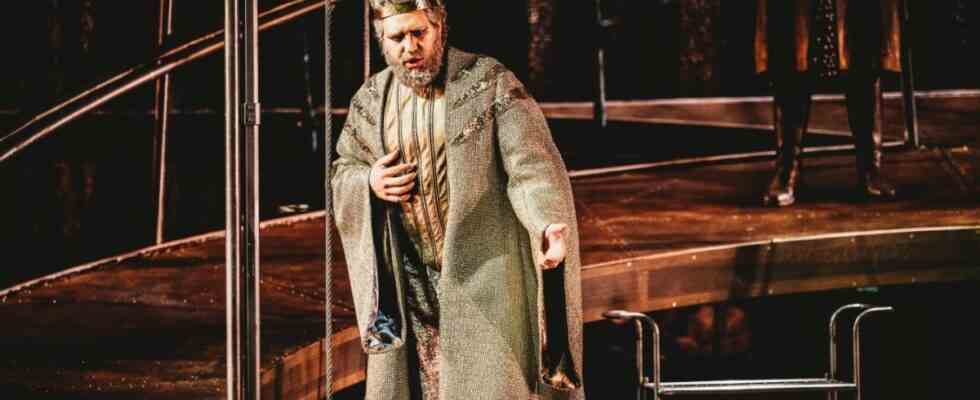Wagnerians don’t have the reputation of being particularly adventurous contemporaries. In any case, they confirm that at the Tyrolean Festival Erl, which has been a Valhalla of Wagner care since its founder Gustav Kuhn. In the case of “Le roi Arthus” by Ernest Chausson, on the other hand, the passion play hall is not even half full. What are the Wagnerians missing? Another opera by Wagner, only in French. With his drame-lyrique, which he worked on for seven years, Chausson (1855 – 1899) is one of the many composers who did not escape the long shadow of the Bayreuth Wizard. It would be pointless to show the many parallels in the choice of material, scene structure, motifs down to the last detail in the self-written libretto. Except that Chausson, as a Frenchman, was rooting in the Celtic myth surrounding King Arthur and his Round Table instead of in the Germanic. What is it about? A mixture of “Tristan” and “Parsifal”, loyalty and betrayal, honor and consuming passion, knightly values and their decline, exemplified by the adultery that Genièvre commits with the hero Lancelot on Arthur.
Now, Chausson is not only a technically brilliant composer in his best-known work, the Poème for violin and orchestra op. 25. And therefore musically also a brilliant copyist, as the orchestra and choir of the Tyrolean Festival make it clear: there is the same harmonic twilight as with Wagner, the sweet poison of the chromaticism, the dense and refined instrumentation, above all the never-ending stream, piling up again and again orchestra surges. Conductor Karsten Januschke illuminates an intense color palette with the festival orchestra, always playing in the background of the stage in the Passionsspielhaus. He could perhaps let the passions boil over a little more violently in the following performances.
Anyone who has always seen Wagner as the forerunner of the fantasy epic will get their money’s worth with this stage design
Putting something like that on the program suits Bernd Loebe, the still quite new director in Erl, who in his main job as director of the Frankfurt Opera has long been inspiring his audience for rarely heard. Because Loebe is also known for tracking down the right singers: the young Domen Križaj shows a truly royal format as Arthus, carrying his noble, rounded baritone on endless breath. Aaron Cawley fights his way gallantly through Lancelot’s heroic tenoral endless struggle. And Anna Gabler touches Genièvre in the death scene, even if she could discover the seductive power of a “Parsifal” Kundry even more. In the four-hour heroic epic (including two breaks), the lovers get three duets (of which at least one is too many) and, like Wagner, are allowed to indulge in long monologues even with minor characters. Who fill Andrew Bidlack (Lyonnel), Kabelo Lebyana (Merlin), Carlos Cárdenas (Ackersmann) or William Meinert (Mordred) without fail.
Anyone who has always seen Wagner as the forerunner of the fantasy epic will clearly get their money’s worth with the stage and costume designer Takis: in the middle of the stage there is a circular track that would also be suitable for a “ring”, plus suits of armor and swords, where does that go eye looks, albeit from somewhat coyly modern fabrics. But there is a real fire magic at the end before Arthur glides over into the eternal mists of Valhalla, sorry, Avalon. What exactly the director Rodula Gaitanou did during the rehearsals, on the other hand, remains rather nebulous. So Wagner for once without any directing theatre, Wagnerians, what more do you want? With this in mind: Off to Erl!

